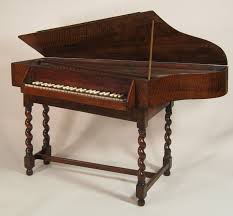spinet
英 [spɪ'net; 'spɪnɪt]
美 [ˈspɪnɪt]
TOEFL
spinet 斯皮耐琴(小型拨弦键琴)来自意大利语 spinetta,一种拨弦乐器,来自拉丁语 spina,尖刺,代指琴拨,-etto,小词后缀。
- spinet
- spinet: [17] A spinet is a sort of small harpsichord. English acquired the term via early modern French espinette from Italian spinetta, and one version of its origin is that it came from the name of one Giovanni Spinetti, a Venetian who supposedly invented the instrument at the beginning of the 16th century. A more prosaic story is that it was a diminutive form of spina ‘thorn’ (a relative of English spine), the allusion being to the plucking of the strings with thornlike quills.
- spinet (n.)
- 1660s, spinette, "small harpsichord," from Middle French espinette (16c., Modern French épinette), from Italian spinetta, said by Scaliger to be a diminutive of spina "thorn, spine," from Latin spina "thorn" (see spine), so called because the strings were plucked with thorn-like quills [Barnhart]. The other theory (favored by Klein and assigned "greater probability" by OED) dates to early 17c. and claims the word is from the name of the Venetian inventor, Giovanni Spinetti (fl. c. 1503). As "small, upright piano" from 1936.
- 1. His nails resemble the ivory keys of the spinet.
- 他的指甲象白色的琴键一样.
来自辞典例句
- 2. One afternoon, when I was better, I played the spinet.
- 有天下午, 我好了一点时, 便弹奏钢琴.
来自互联网
- 3. But the spinet was too big for me to play.
- 但是钢琴太大了不适合我弹.
来自互联网
[ spinet 造句 ]
